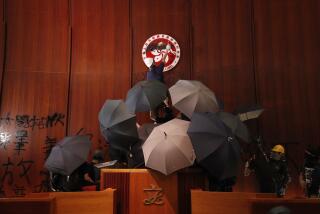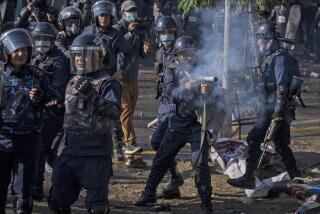130 Police Hurt as Rioting Hits 2 China Cities
- Share via
BEIJING — A pro-democracy demonstration by students in the city of Xian in central China erupted into violence Saturday when protesters tried to force their way inside the provincial government compound.
The official New China News Agency blamed the violence on “lawbreakers from the community”--usually a reference to young hoodlums--rather than the demonstrating students. The rioting, in which 130 policemen were injured, came after students had gathered during a memorial service for former Communist Party leader Hu Yaobang, the agency said.
Violence in Changsha
Violence also broke out Saturday during a student march honoring Hu in Changsha, the capital of Hunan province in southern China, according to Western witnesses.
The trouble in Xian began immediately after a televised broadcast of a memorial service in Beijing for Hu, a reformist leader who has become a symbol of democratic aspirations of Chinese youth. Hu, 73, who died April 15, was ousted from the party leadership two years ago for failing to put down student protests.
Westerners reached in Xian by reporters in Beijing said that although many of the rioters appeared to be non-students, the clash began when the crowd of mostly student demonstrators, estimated at about 5,000, charged a line of 400 police armed with night sticks.
The official news agency said that “students from colleges and universities were in ranks observing the memorial ceremony, but some lawbreakers from the community were also moving in the square, shouting anti-government slogans.”
The “lawbreakers” burned 10 vehicles and about 20 houses, the news agency said. It made no mention of injuries to “lawbreakers” or students, but said that there were no reports of deaths and that order was restored after about 12 hours.
During the Saturday morning service, at least 15,000 students in Beijing--some estimates were more than double that number--were staging a pro-democracy protest in front of the Great Hall of the People where the memorial service was held. After a tense but brief scuffle between protesters and police early in the afternoon, the demonstrators returned peacefully to their campuses.
The national television broadcast made no mention of the protesters outside the Great Hall of the People.
Pro-democracy student demonstrations, linked to mourning for Hu, have taken place in at least half a dozen cities across China during the past week.
Saturday’s violence in Changsha came when unruly crowds following a procession of about 1,000 students began smashing shop and car windows, according to the Western witnesses.
Students commandeered a bus and truck during the march from Hunan University to the provincial government headquarters, according to a source who spoke by telephone with the Associated Press in Beijing.
Later, the students were joined by thousands of non-students, including young street toughs who “went wild” and began breaking store windows, this source said.
It appeared that the scene in Xian was similar to that in Changsha, except apparently more severe.
“The lawbreakers had clashes with police on duty when attempting to force their way into the government compound,” the news agency reported. “They set fires to a janitor’s room, a reception room and a truck at the gate.”
The university students, “alarmed by the violence” left the square after the trouble began, the Chinese agency reported.
Early in the evening, rioters stoned a bus carrying foreign tourists when it entered the square, breaking its windows, the agency said. Xian--site of the famous terra-cotta warriors in the tomb of the first Qin emperors--is a major tourist stop about 570 miles southwest of Beijing.
There was no immediate report on the nationalities of the tourists or whether they suffered injuries.
At 7:30 p.m., the mob outside the government compound pulled down one of its walls, burned two cars, a jeep, a truck and a three-wheeled vehicle, and set fires to an oil tank and a garage, the agency said. Rioters also entered court and prosecutorial buildings, smashing windows and setting curtains on fire, it said.
Paramilitary police moved into the square at 8 p.m., according to the report. The rioters, as they fled the square, burned two buses and robbed a garment shop. WHAT THEY WANT
Chinese demonstrating in Beijing and other cities called for progress toward democracy. Among their specific demands:
Wider limits for political debate, press freedom and channels for public views to reach decision-makers.
Public supervision of how policies are carried out by officials.
Reduced government control of the economy to promote development and stop use of official power for personal gain.
Disclosure of wealth and income of leaders. Higher pay, greater influence and social status for intellectuals.
More to Read
Sign up for Essential California
The most important California stories and recommendations in your inbox every morning.
You may occasionally receive promotional content from the Los Angeles Times.










